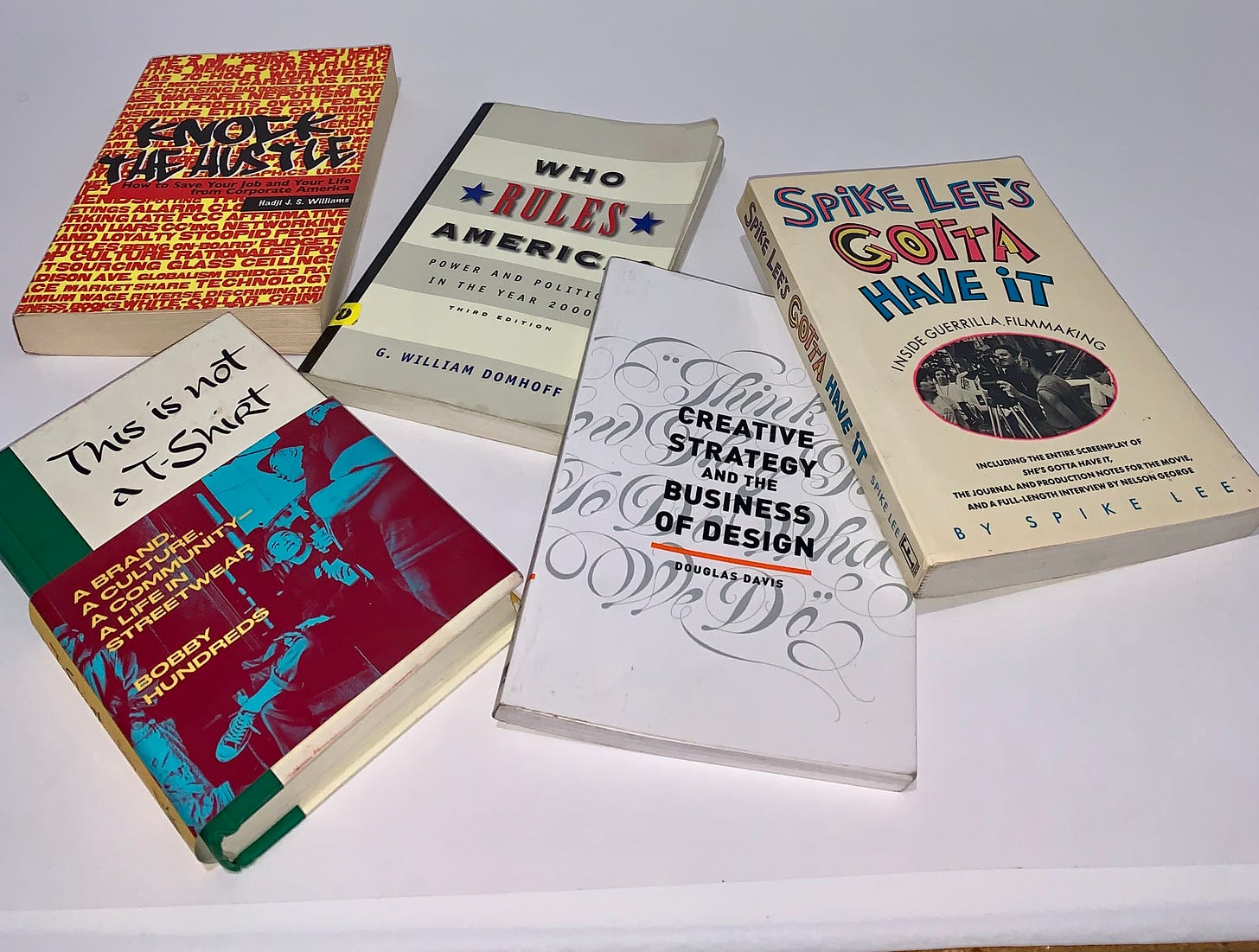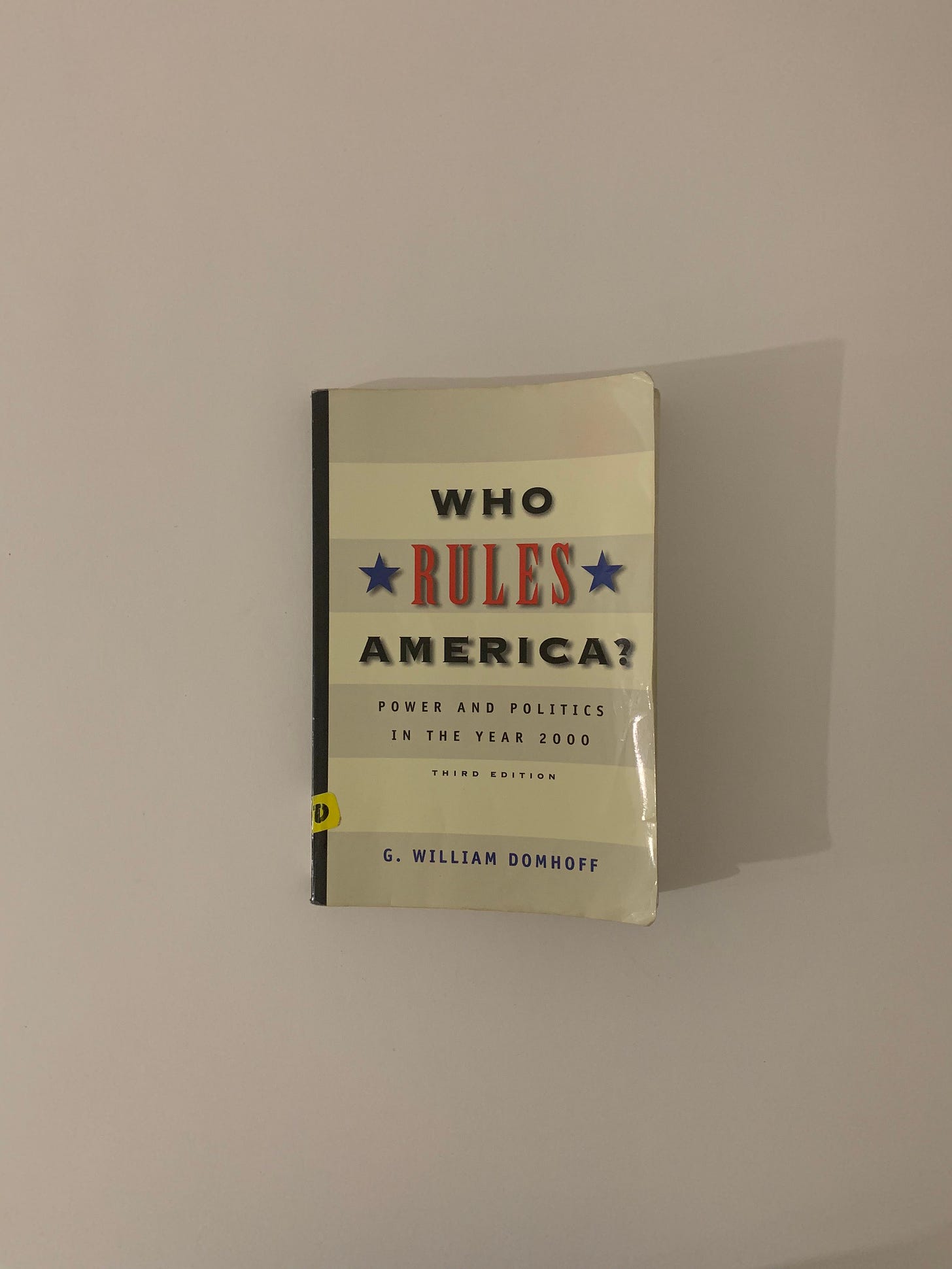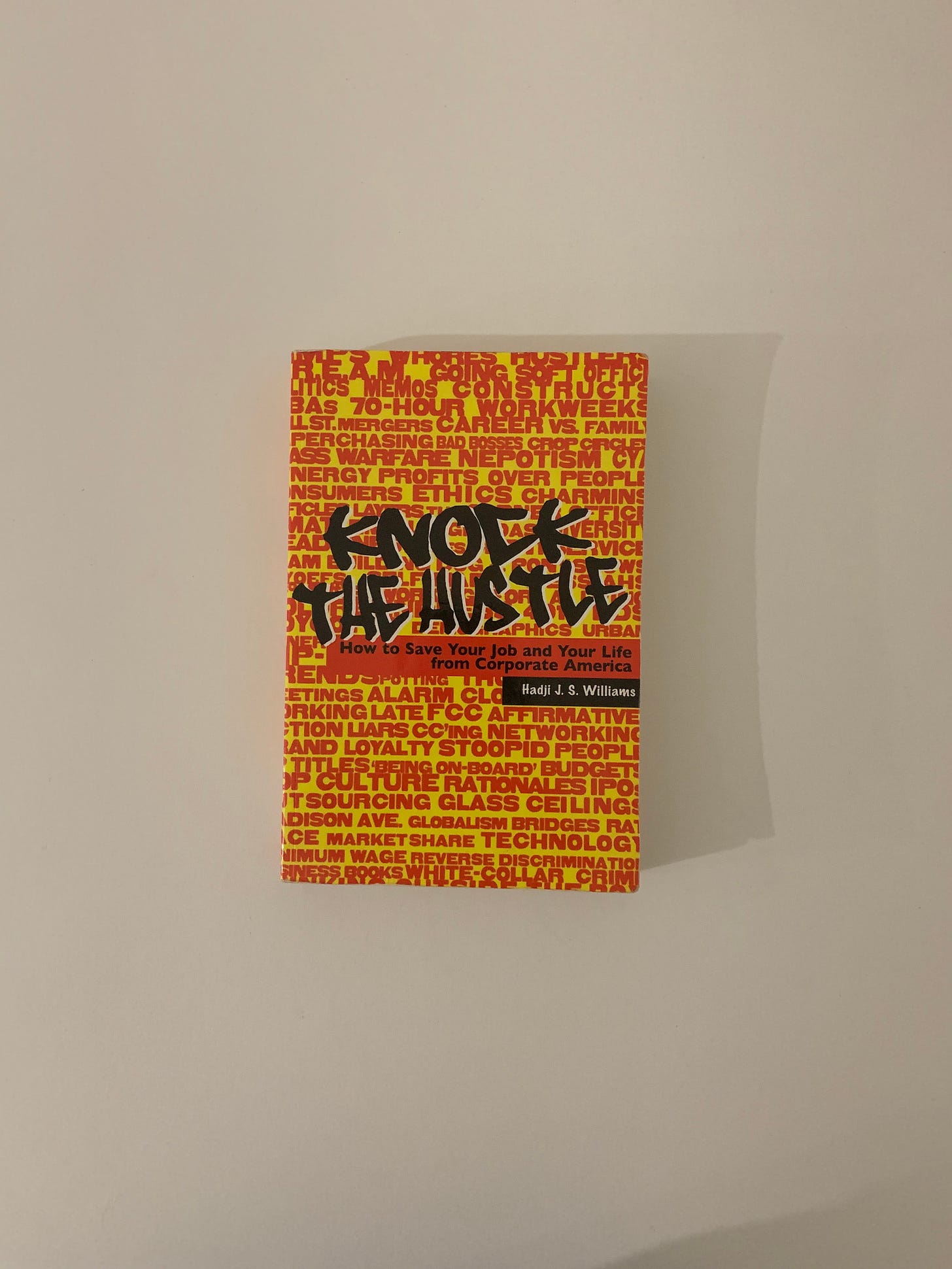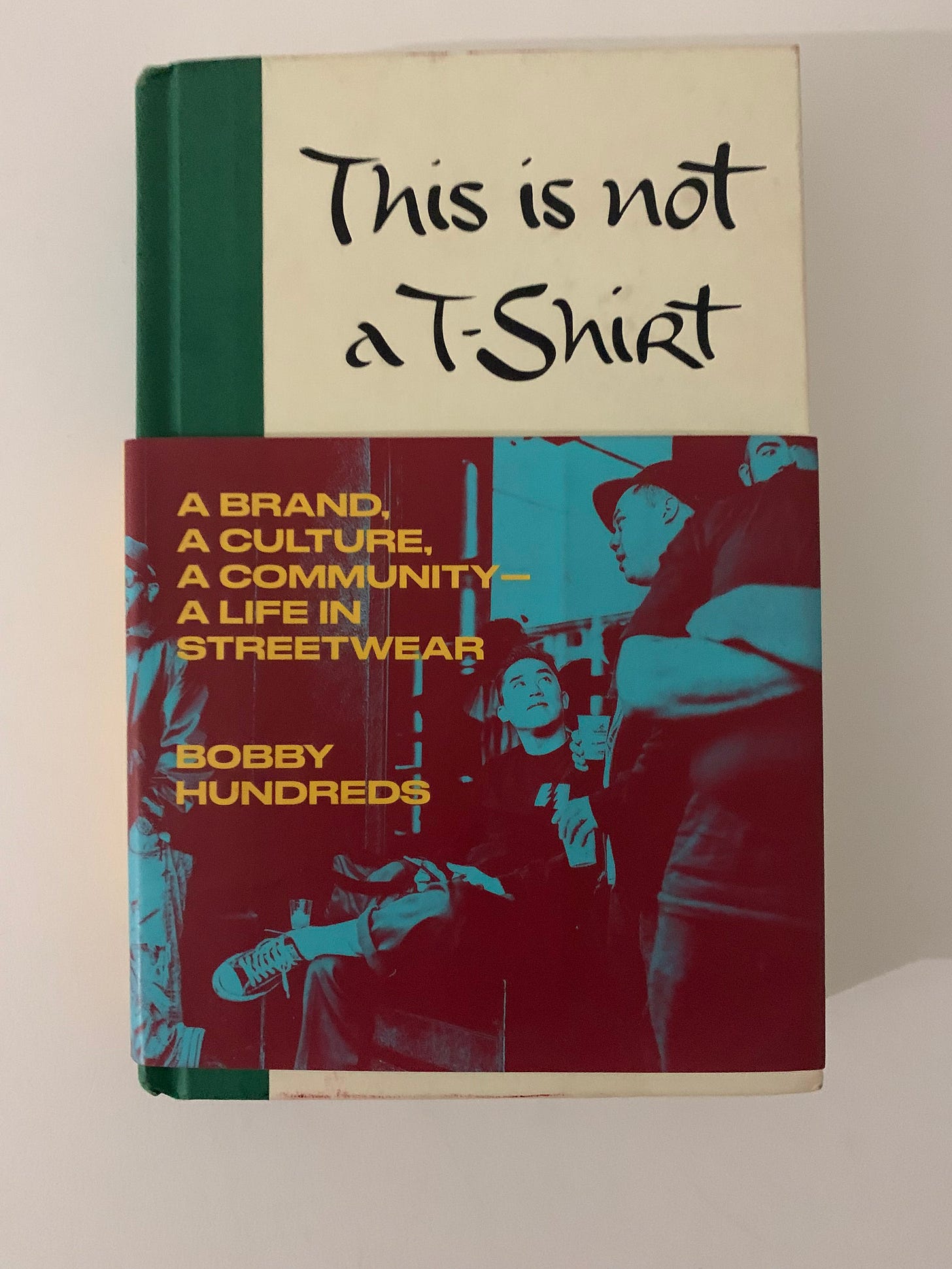34: 5 Books That Will Change How You See The World
Consider these your cheat codes to a better balance

Before we begin, this is the first subscriber-only Office Hours newsletter. I want to take a moment to thank you all for supporting me to this point. As with most things, this is an experiment and the fact that people choose to invest in me and what I have to say is not only appreciated, but inspiring. We’re going to have a lot of fun in months to come, but thank you for believing in what we’re doing here.
It’s a bad cliché at this point that the most important things you will learn in life aren’t learned in school. I know in my life, the most important things I’ve learned I had to figure out on my own as an adult. What hasn’t changed is my love of reading and how it provides the quickest return on investment when it comes to bossing up in the worlds of culture and business.
That being said, I’m consistently frustrated by the current state of books being churned out around culture and business. The people writing them either haven’t accomplished the stuff they’re claiming to help you accomplish, they claim the solution to happiness and poverty is one specific system...that they just HAPPEN to be selling(What are the odds?), or the worst one: When generic business strategy is shoehorned into whatever popular cultural phenomenon, happen to be #1 at the time.

(Seriously?)
Here’s a free one: Don’t be the person who applies war strategy to a job where you don’t have any actual control over anything. All it does is make you act weird and competitive during a point where you probably need to be working well with others to be successful. You’re not Genghis Khan or Jon Snow. You’re a junior (or mid-level, or bored in upper management) who secretly wants to be running your own thing.
...or maybe you’re an entrepreneur who’s seen success but now find yourself against roadblocks that make no sense or you’re working at a scale that can be overwhelming when you’ve never done that much volume before?
...Maybe you’re the only one who looks like you at work and because of the cultural divide, you miss out on chances to progress and prove your intelligence and value?
Regardless of where you currently sit in a hierarchy, you’re ready to boss up. I’m here to help. See, I’m frustrated when books aim to provide generic advice in a shiny coating. I hate when people get bad info when they’re innocently seeking knowledge and most of all, I HATE having my time wasted!
That’s why this newsletter is all killer, no filler. Five books that I can promise have value to you within the immediate completion of reading them. To make it even easier, I’ll share a targeted audience and a key takeaway for each read so you can get the context.
Sound good? Let’s read!

Who Rules America? Power And Politics In The Year 2000
By G. William Domhoff
LIBERAL ARTS MAJORS, STAND UP.
I think it’s weird as hell that people will take business classes in college but then set out to use that knowledge without understanding the people who make up the buyers they’re trying to reach. This book is definitely a textbook — there are stats everywhere as well as that overly complicated language you get when trying to talk scientifically about culture — but it provided me with the best overall understanding of how power works in the US over the last 50+ years.
Professor Domhoff lays it out plain and simple: The rulers of America are the owners and managers of large income-producing properties; i.e., the owners of corporations, banks, other financial institutions, and agri-businesses.They get plenty of help from the managers and experts they hire. On a local front — think major cities like Chicago and LA — power is dominated by the land owners and businesses that own downtown real estate and big shopping malls. These folks come together under a concept called growth coalitions, which turn cities into "growth machines" when they gain control of local government. Everything is about land values for them, and that requires office buildings, stadiums, museums, concert halls, shoppers, conventions, and tourists. THAT is what leads to concepts like gentrification and displacement. As an added bonus, he breaks down how the electoral system in the US has worked since the 50s and how someone can win the popular vote but still not end up being President...It’s a must-read!
BEST FOR: Everyone who lives in the United States of America; People who want to sound smarter in political discussions
KEY TAKEAWAY: You aren’t winning because you don’t know how the game works.

Creative Strategy and the Business of Design
By Douglas Davis
This book provided crazy value for me at my first agency gig. I didn’t understand what the key words were that got things moving or got me a “yes” from clients. I had good ideas but couldn’t communicate with them in a familiar context. As I’ve learned over the years, context is EVERYTHING. The book will help you think about how designers think, an invaluable resource if you’re in agency life. It also teaches you the jargon and vocabulary that you’ll need to work with the account side of things, a pain point for many creatives in the ad/marketing world that I know. If you have a creative eye and the tools to be able to understand how to articulate your vision across multiple mediums, you can make a lot of money.
BEST FOR: People who want to do design, strategy, advertising or marketing but didn’t go to school for it; Journalists who are trying to pivot to agency life and only know how to tell stories via word; Advertising creatives who hate their relationship with account services
Key Takeaway: Learn their language.

Knock The Hustle: How To Save Your Job And Your Life From Corporate America
By Hadji S. Williams
The world is unfair. The anecdotes shared in this book by Williams — who has worked at some of the biggest ad agencies in Chicago, all under pseudonyms here — are proof of that. From how talented people get screwed in office politics to how prevalent drug use, sex and gambling can be in huge organizations, the book has a lot of insights that might shock some, but serve as context for the places you work at every day. Again, the game is rigged. With this book, I learned how to function and excel anyway.
BEST FOR: Young people of color entering the workplace who didn’t grow up around white people; midlevel people of color in the workplace who can’t figure out why they can’t get promoted
Key Takeaway: The Game Is Rigged. Win anyway.

SPIKE LEE’S GOTTA HAVE IT: A GUIDE TO GUERILLA FILMMAKING
BY SPIKE LEE
Spike Lee did not give a FUCK. (I’d wager he still doesn’t.) This book is equal parts interview, diary, memoir and creative resource all in one. Spike shares the story of how he became a filmmaker, which is a level of transparency no other director of his stature has shared. He also shares the full run script for his now-iconic “She’s Gotta Have It”, the self-financed film that skyrocketed him to Nike commercials and international acclaim. The main things to note here are his analyses of the film industry and how it treats black filmmakers as well as many handy tips and tricks that are applicable now as they were then. I’d also recommend this as a good read when impostor syndrome creeps in. Lee has doubts, but there’s never a moment where he doesn’t feel like he’s going to succeed. That mentality is needed if you’re ever going to accomplish anything worth doing creatively.
BEST FOR: DIY Creators; Creatives dealing with imposter syndrome; People who didn’t grow up around black people (I’m serious!)
Key Takeaway: If Not You, then Who?

This is Not A T-shirt: A Brand, A Culture, A Community - A Life in Streetwear by Bobby Hundreds
We all need help. That point is echoed several times throughout this memoir from Hundreds, the co-founder of streetwear company The Hundreds. Their story is vivid enough to serve as a reboot for the defunct HBO show How To Make It In America, but the points to focus on are how the company lived and died by the help they got. From brands lending authenticity via collaborations to the lesser-known tastemakers who power cultural output worldwide to the folks like you and me who buy things like clothes and shoes as a representation of our personal beliefs and values. It was so inspiring and refreshing to hear someone who I respect being transparent about anxieties and the process of making “cool stuff” that I read this book in 2 days.
BEST FOR: People building creative businesses, creatives who want to work in clothes/music, brand types who want to learn how to better communicate with creative freelance talent.
Key Takeaway: NOBODY does it alone.
I hope you read these books! If you do and enjoy them, shoot me an e-mail. I’d love to hear from you.
If you enjoyed this story, forward to a friend and tell them to sign up for the newsletter!
Office Hours is written by Ernest Wilkins. Follow him everywhere @ErnestWilkins


